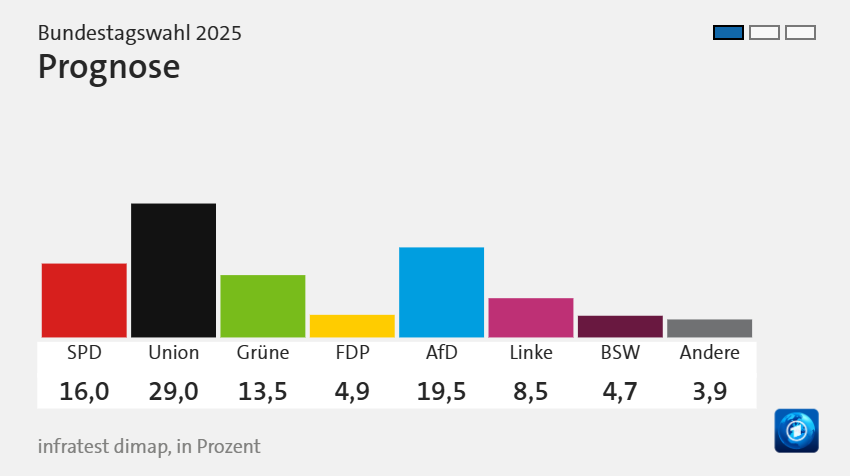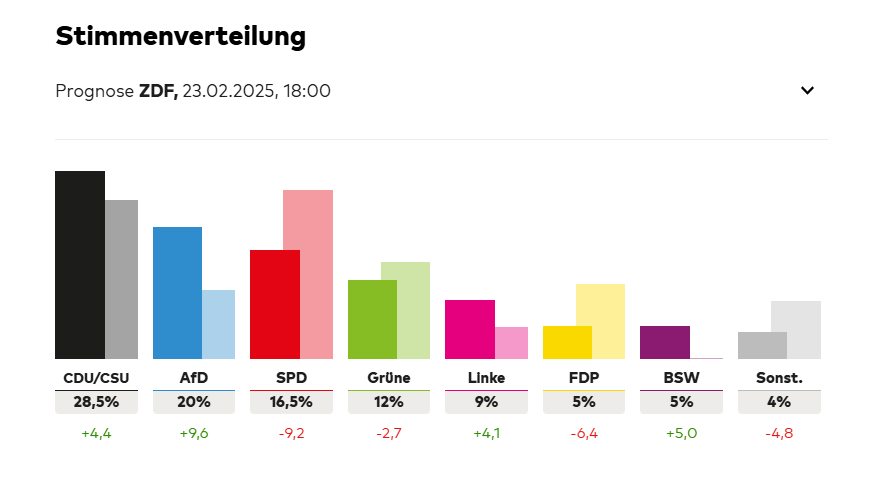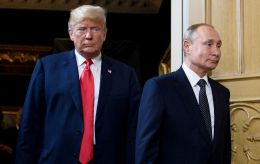German elections: Forecasts and exit polls
 Friedrich Merz's CDU/CSU wins the German elections (photo: Getty Images)
Friedrich Merz's CDU/CSU wins the German elections (photo: Getty Images)
The elections in Germany, which are leading to a change of power in the country, have ended. According to forecasts and exit polls, the conservative CDU/CSU alliance is winning, and its leader Friedrich Merz has secured his chances of becoming chancellor.
According to official data, a record turnout of 83% was recorded in the early elections of 2025.
Prediction of the ARD TV company.
According to it, the Christian Democrats' bloc CDU/CSU gains 29% of the vote and is the clear winner of the elections.
The far-right Alternative for Germany (AfD) just misses the 20% mark and gains 19.5%. The Social Democratic Party of incumbent Chancellor Olaf Scholz is at 16%, and the Green Party is at 13.5%.

In addition, the Left may enter the Bundestag with a forecast of 8.5%. The Free Democratic Party (FDP), which was previously part of the ruling coalition, gained 4.9% and did not pass the threshold.
Prediction of Forschungsgruppe Wahlen, ZDF
The CDU/CSU, led by chancellorial candidate Friedrich Merz, gains 28.5%.
He is followed by the AfD with 20%, the SPD shows the worst result in its history with 16.5%, and the Greens with 12%.

"The Left gains 5%, making up for lost ground in recent weeks. The FDP and Sarah Wagenknecht's Union are on the verge of entering the Bundestag with 5%.
How the elections were held
Polling stations across the country opened at 08:00 local time (9 a.m. Kyiv time). Almost 60 million voters elected 630 members of the lower house of parliament, known as the Bundestag. Voting ended at 18:00 local time (7 p.m. Kyiv time).
The process was not without incidents. For example, polling stations in Cottbus (Brandenburg) experienced problems with electricity in the morning, and heating systems failed. It was reported that four out of about 50 polling stations were not working.
What were the ratings of the parties?
Although polls showed that the conservative Christian Democrats (CDU/CSU) bloc would win the most votes, it was unlikely that they or any of their rivals would immediately win a majority.
This means that two or more parties will likely have to form a coalition. This process can take weeks or months of coalition negotiations.
According to the ZDF-Politbarometer poll, after four years in opposition, Merz's bloc has a good chance of returning to power (after the worst result in history in the 2021 elections and the departure of Angela Merkel). The CDU/CSU's rating was estimated at 30%.
This was followed by Alice Weidel's right-wing Alternative for Germany with 20%, Olaf Scholz's Social Democratic Party with 20%, and the Greens with 14%. On the verge of entering the Bundestag were the Left, the Sarah Wagenknecht Union, and the Free Democratic Party.
Who will become chancellor?
The victory of the Christian Democrats virtually guarantees the post of chancellor to Friedrich Merz. But for this, a coalition has yet to be formed and it is not yet clear who will be the partners of the CDU/CSU.
Alternatively, a grand coalition with the Social Democrats of the current Chancellor Scholz. However, according to pre-election calculations, there may not be enough mandates and a third party will have to be involved. The chances of the AfD party (called a pro-Russian force) joining the new government are considered negligible due to its right-wing ideology.
For more information about the election timetables, read the article "Who will replace Scholz? How the German elections will end and what Ukraine should expect."
On the eve of the election, Scholz said that he believed in a result that would allow him to retain the post of chancellor.
During the campaign, facts of Russian interference in the election were revealed with the help of fake videos on the Internet in favor of Alternative for Germany.

